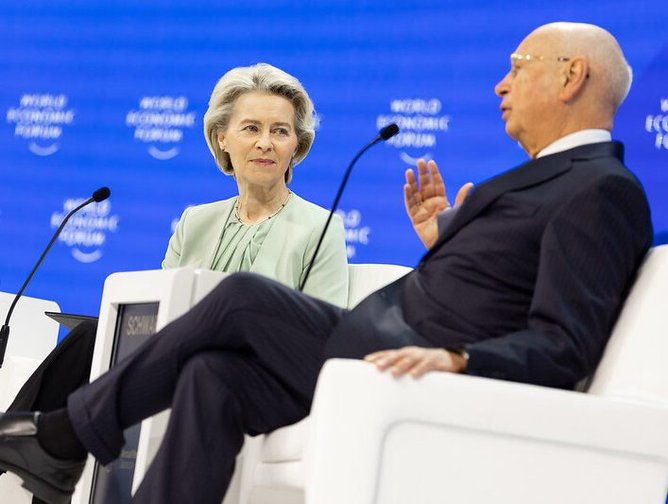AI: Tackling Ethics, Equality and Misinformation at Davos

One of the most talked-about topics of the last year, Artificial Intelligence (AI) continues to dominate the conversation – first at COP28 in December and now at the 54th Annual Meeting of the World Economic Forum in Davos.
Looming large over the high-profile Swiss event, AI is one of the four core themes at Davos, with 30 separate sessions taking place over the four days. AI in education, transparency about AI, its ethics and impact on creativity are all part of the lineup.
And the world's biggest AI players have turned out in force, including OpenAI Sam Altman, Microsoft CEO Satya Nadella, Meta’s chief AI scientist, Yann LeCun, and Google CFO Ruth Porat – who joined a panel to discuss the potential of AI.
There is little doubt as to the potential of AI in almost every aspect of life, from business efficiency to climate change.
It has the potential to revolutionise many industries, from healthcare to finance, and is already showing how it can improve efficiency, reduce costs, and increase accuracy.
As for the planet, AI can mitigate carbon emissions, support adaptation, and enhance climate modelling, among its many talents, a report by BCG and Google finds.
And it is already being harnessed for good.
During COP28, Microsoft announced a collaboration with the UN to develop a new AI-powered platform and global climate data hub – which it claims will ultimately measure and analyse climate progress.
Speaking on a panel (AI: The Great Equaliser), at Davos this week, Google CFO Ruth Porat said AI can “really transform lives” with healthcare and climate change two areas already benefiting.
Porat pointed to the work Google has done around climate change adaptation and crisis management, like fires and flooding.
“With Google AI, we have created the capability to give seven days warning. AI has the potential to be the greatest equaliser.”
Speaking to CNBC on the first day of Davos, Maurice Levy, Chairman of Publicis Group declared AI to be “more transformational than the mobile phone”.
He said people shouldn’t be afraid of it, even if there will be a few years of adaptation and job destruction – because all-in-all, “AI will be a good thing for humanity”.
While most leaders acknowledge AI offers enterprises immense potential to create value in business and society and solve complex challenges, like reducing Scope 3 emissions – the ethics and risks around the technology –and Generative AI in particular is gaining equal attention at Davos.
Misinformation Generated by Gen AI Impacts Society
Among risks, the spread of ‘misinformation’ – false and misleading information that threatens to dissolve democracy and polarises society – is the most concerning.
So says WEF’s just-published Global Risks Report 2024, which not only puts AI high on the agenda, but lists mis- and dis-information as the world’s greatest short-term threat.
Misinformation refers to content that is misleading or factually incorrect, while disinformation is strategically created and deployed to deceive the audience.
And AI is increasingly being leveraged to generate it.
The report notes that with Gen AI tools such as ChatGPT-4 and Bard, it is now easier to create texts, images, and videos that are often indistinguishable from those produced by people – making it easier to fabricate and spread mis- or dis-information online.
The issue is especially significant now, as we gear up for the biggest election year in history, where more half of the world’s population across 65 countries take to the polls including large economies like the US, UK, India and Indonesia.
These elections pose potential shifts within the ESG regulatory landscape, on climate policies and industrial strategies and have a major impact on people’s lives, society and the health of the planet.
Back-to-back addresses on the second day of Davos by Premier Li Qiang of China and Ursula von der Leyen, the President of the European Commission, alluded to this.
Describing herself as a “tech optimist” and referring to AI as a “very significant opportunity, if used in a responsible way”, Von der Leyen did however warn of the very serious risks in spreading false information – which limits “our ability to tackle the big global challenges we are facing” from changes in our climate to spiralling regional conflicts.
Emphasising the need for AI to serve the common good, Li Qiang added that without appropriate governance, AI “poses risks to security and to our ethics”.

AI Will Likely Worsen Inequality Unless Government, Tech Take Measures
Echoing the need for good governance, in a panel on AI equality, the UN Secretary-General’s Envoy on Technology Amandeep Singh Gill outlined the potential misuses and risks of AI, including misinformation and the exclusion of certain communities, and urged action on good governance –to “earn the trust of the users and the public at large”.
Taking a tougher stance, UN Secretary General Antonio Guterres likened the risks of AI to those posed by the climate crisis.
He warned the tech multinationals were “already pursuing profits with a reckless disregard for human rights, personal privacy, and social impact”.
Referring a recently published IMF report, Guterres warned the technology was “likely to worsen inequality”.
The report, Gen AI: Artificial Intelligence and the Future of Work, reveals that AI will affect about 40% of jobs globally, about six in 10 jobs in advanced economies, 40% in emerging markets and 26% of roles in poor countries.
While less advanced economies may experience less AI-related disruptions, they are also less prepared to tap the technology’s benefits – which could worsen the digital divide and cross-country income disparity, the IMF states.
While 95% of the global population now lives in areas served by mobile broadband connectivity, billions of people do not still have access – causing major inequality.
“In most scenarios, AI will likely worsen overall inequality, a troubling trend that policymakers must proactively address to prevent the technology from further stoking social tensions,” said IMF managing director Kristalina Georgieva.
“It is crucial for countries to establish comprehensive social safety nets and offer retraining programmes for vulnerable workers. In doing so, we can make the AI transition more inclusive, protecting livelihoods and curbing inequality.”
Calls For Urgent Action on AI Governance
In his Davos address, Antonio Guterres also urged tech industry executives to work with governments to put in place guardrails for AI.
“We need governments urgently to work with tech companies on risk management frameworks for current AI development; and on monitoring and mitigating future harms. And we need a systematic effort to increase access to AI so that developing economies can benefit from its enormous potential. We need to bridge the digital divide instead of deepening it.”
Big tech says it welcomes such governance – and is already putting in place systems to prevent AI being misused.
They also insist the roll-out of Gen AI will create more jobs than it destroys, with a recent study by the International Labour Organisation finding it is “more likely [most jobs] will be complemented by automation, rather than replaced entirely”.
During Davos, Microsoft CEO Satya Nadella said he was “hopeful” and “optimistic” about the future of AI – but emphasised countries should take an equal stance when it comes to industry standards.
In a discussion with Klaus Schwab, Chair of the WEF, Nadella discussed how global safety guardrails are needed and that a global regulatory approach would be “very desirable”.
“These are global challenges and require global norms and standards,” he said.
“Otherwise, it’s going to be very tough to contain, tough to enforce and tough to, quite frankly, move the needle even on some of the core research that is needed.”
*******************
Make sure you check out the latest edition of Sustainability Magazine and also sign up to our global conference series - Sustainability LIVE 2024.
*******************
Sustainability is a BizClik brand.
- ‘Client Zero’ IBM’s Guide to Using AI for SustainabilitySustainability
- PwC & Microsoft use AI to Help Clients Transform to Net ZeroTech & AI
- Could AI and Data Help Nestlé Make Coffee Climate Resilient?Sustainability
- Shannon Schuyler, PwC joins Sustainability LIVE New YorkDiversity & Inclusion (D&I)






